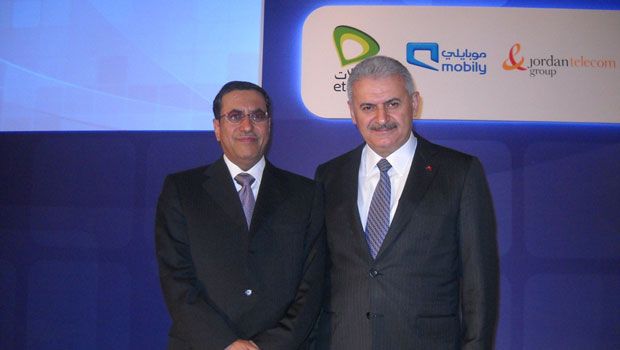 Seven operators, including Superonline, a Turkcell Group company, from Turkey, UAE, Saudi Arabia, Jordan and Syria on Thursday announced that they are building the Middle East's longest redundant terrestrial communications infrastructure along a 7,750 kilometer round trip route. The RCN (regional cable network) project will extend from the city of Fujairah in the United Arab Emirates to Istanbul in Turkey and then to Europe and will serve as a gateway to the Internet for 2 billion people.
The RCN project was signed by the seven telecom operators during a ceremony held on Thursday in Ankara. The event was attended by the Minister of Transport and Communications Binali Yıldırım, RCN project interim Consortium Chairman Ali Amiri, the CEO's of the founder members of the consortium; including Turkcell CEO Süreyya Ciliv, Mobily COO Abdulaziz Altamami, Jordan Telecom Group CEO Nayla Khawam, Mada Group Managing Director Charles Hage, Syrian Telecommunications Establishment Director General Nazem Bahsas and Superonline CEO Murat Erkan.
Starting from Fujairah (UAE) and passing through Riyadh (Saudi Arabia), Amman (Jordan), Tartous (Syria) and reaching Istanbul (Turkey), the RCN project's fiber optic cable line will cover the entire Gulf region in the Middle East for the first time through a uniform infrastructure. About 3,875 km in radial length and totaling 7,750 km with its round trip routes, the RCN project will become the region's longest redundant terrestrial fiber infrastructure between Fujairah, one of the busiest nodes for submarine and fiber cables, and the West.
"Our participation in the regional cable network comes as part of our commitment to contribute to the regional and global connectivity by expanding the reach of our robust, reliable and trusted Saudi National Fiberoptic Network through having multiple routes available for data communication traffic originating from inside the Kingdom or transiting from the networks of other operators," Altamami said.
Speaking at the Signing Ceremony, Ciliv emphasized Turkcell's satisfaction at this joining of forces between powerful, excellent organizations intent on technological leadership in a region where Turkey and the Turkcell Group are major players. Drawing attention to the changing global economic situation, Ciliv remarked that the RCN project, which is noteworthy for its capacity and its diversified structure, is planned to accommodate specific requirements to bring significant advantages to the region by connecting it to the world via Turkey. Predicting that the RCN infrastructure would promote growth of Internet penetration in the region, Ciliv said, "This will enable still wider Internet expansion as Internet use will become even faster throughout the region."
He added, "Through this gigantic infrastructure project which starts in the United Arab Emirates and runs the entire length of Turkey, we are building an Internet highway between Fujairah and Istanbul. The RCN project will allow Internet traffic from so far has struggled along a narrow pathway to comfortably reach the speed of a multi-lane highway. One of the key stops along this route will be Istanbul. Positioned in the project as the Middle East's Internet gateway to Europe, Istanbul is poised to become the world's newest Internet base due to its geostrategic location. We, the Turkcell Group, are proud to be making such a beneficial investment for Istanbul, for Turkey, and for the region changing lives by offering users an enhanced communications experience."
Yıldırım stressed that the RCN project would create a welcome opportunity for investors in the countries involved to access their investments and businesses in other countries. Commenting that the establishment of this fiber optic network would help boost Turkey's communication volumes, business relations and trade within other countries in the region. Yıldırım said, "We regard this project as one of the fruits of our successful foreign policy. This cooperation between five countries will further enhance the already close relations we have been cultivating recently across in the region."
Addressing the ceremonial assembly, Amiri described the RCN as being unmatched in terms of speed, quality, ease of upgrade, redundancy, and reliability. Recalling that the dual fiber lines would cross five countries and intersect in five cities, Amiri stated that this infrastructure has the ability to provide the tremendous capacity of 12,8 terabits per second.
The RCN project brings together top telecom companies from five countries. Each a leader in communication technology in their respective countries, Etisalat (UAE), Mobily (Saudi Arabia), Jordan Telecom/Orange Jordan, Mada-Zain Partnership (Jordan), Syrian Telecommunications Establishment (Syria), and Superonline (Turkey) have signed their names to the project. With an approximate investment value of half a billion dollars, the fiber optic line will be operational in the second quarter of 2011.
|